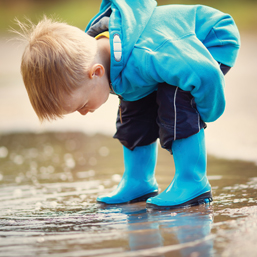
It’s a cloudy, rainy day and your little ones are restless. You look out the window, wishing you could send them outdoors to play. Well, what’s stopping you? Have you ever seen a child walk around a mud puddle? Absolutely not. Kids will go out of their way to step right in the middle of that puddle. They aren’t worried about getting wet or dirty; it’s adults who worry about silly things like that. Bundle them up, add slickers, rubber boots, and let your kids play outside in the rain.
Richard Louv, in his landmark book on outdoor play, Last Child in the Woods, speaks of a phenomenon he calls “nature deficit.” He points to growing numbers of obese children sitting indoors for many hours a day absorbed in passive screen-watching. He attributes the rise in attention disorders and childhood depression, conditions rare in the olden days, to lack of outdoor play.
Early childhood experts agree with Louv. Children need to engage in regular, unstructured outdoor play. They need to run and jump and climb. They need to interact with the natural world and enjoy the wonder of the diversity and beauty of the out of doors. It’s healthy for kids, and it’s largely missing in today’s hectic, fast-paced family lives. But you can change all of that.
Benefits of ‘puddle play’
In the case of rain and puddles, early childhood specialists agree on the many benefits of water play. They include:
When children are allowed to create their own play scenarios in outdoor environments, they will naturally engage in the following:
Skill development. When children interact with objects in nature, they automatically ask questions: “Why does the leaf stay on top of the puddle?” Or, “Could this stick float?” These questions are the building blocks of scientific observation and logical, experimental thinking. As your kids play with the water, they’ll engage in large muscle jumps and leaps, and also experiment with fine motor skills as they pour and explore measurement using various-sized containers. They’ll experience sensory input - visual, auditory, and tactile.
Rhythm and rhyme. Water play lends itself to all kinds of rhythm and rhyme fun. Rain poems such as Rainy Day by Claire Louise Milne or Rain by Robert Louis Stevenson invite children to memorize the simple words and add movements as they recite them. Water songs such as Baby Beluga, Row, Row, Row Your Boat, or It’s Raining, It’s Pouring add singing fun to water play. Children love to clap out rhythms or stamp their feet in time to them. They also enjoy soaking in the beauty of music such as Michael, Row Your Boat Ashore. Watch as they interact with the words and ideas to create their own musical drama. Rhythms and rhymes involve careful listening, an important learning skill as well as recognition of patterning, a basic math understanding. Children will also pick up sound (phonemic) awareness, which is a foundational reading skill.
Imaginative play. Left to their own devices, children will explore out of doors and create their own story lines. The mud puddle is an ocean and your little one is a pirate or an explorer. Sea songs will be sung at the top of their lungs and the words from poems and nursery rhymes will emerge. Children will try out new vocabulary words to match their stories and may add all sorts of imaginary characters to the mix. Your role is to provide simple materials such as measuring cups and ask appropriate questions as your child plays.
Yes, playing in mud puddles will be a bit messy. But, rest assured, there will be a happy child at the end of the day. And, yes, a bath may follow - another great opportunity to enjoy the benefits of water play.
Jan Pierce, M.Ed., is a retired teacher and the author of Homegrown Readers and Homegrown Family Fun. She lives in the beautiful Pacific Northwest and still enjoys interacting with young children. Find her at janpierce.net.
Calgary’s Child Magazine © 2024 Calgary’s Child